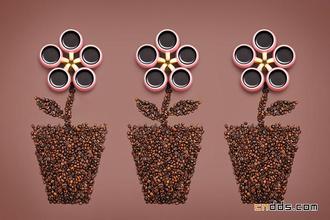Kenyan Jinchu Valley Coffee Bean Grinding Scale Estate Production Area Treatment Variety Introduction
Grinding Calibration of Coffee beans in Jinchu Valley, Kenya Variety introduction to Regional treatment of Manor production
We still choose the familiar medium and shallow baking, but in order to retain the very rich fruit flavor in the raw beans, we increase the temperature of the beans to 210 ℃ and keep the return point at 125 ℃. After entering the pot, we observe the return point and steam the coffee beans over low heat, and observe until the coffee beans whiten evenly at 4 minutes and 30 seconds, then press the fire to complete the dehydration in about 5 minutes and 30 seconds, and then adjust the firepower at 175 ℃ in 8 minutes to make the coffee beans undergo incomplete dehydration and condensation. Produce chlorogenic acid lactone, add a sense of balance, the whole baking time is 10 minutes and 30 seconds, the acidity is very soft and delicate Kenyan coffee beans the Kenyan government takes the coffee industry very seriously, where it is illegal to cut down or destroy coffee trees. Kenyan coffee buyers are world-class high-quality coffee buyers, and no other country can grow, produce and sell coffee on a continuous basis like Kenya. All coffee beans are first acquired by the Kenya Coffee Commission (CoffeeBoardofKenya, CBK), where they are identified, graded, and then sold at weekly auctions, where they are no longer graded. The Kenya Coffee Commission only acts as an agent to collect coffee samples and distribute them to buyers so that they can determine the price and quality. The auction in Nairobi is for private exporters, and the Kenya Coffee Commission pays growers a price below the market price. The best coffee grade is bean berry coffee (PB), followed by AA++, AA+, AA, AB and so on. The fine coffee is shiny, delicious and slightly alcoholic. Auctions are also organized to meet the needs of dispatchers. This kind of auction usually has a small auction volume (3-6 tons each), with samples with the grower's logo for buyers to enjoy. After the auction, the exporters pack according to different flavors, different qualities and the quantity required by the blenders. This provides a great deal of flexibility for the dispatcher. Quality-conscious Germans and Scandinavians are long-term buyers of Kenyan coffee.
On an international scale, the increase in the number of Kenyan coffee is obvious, with exports of 800000 bags in 1969-1970 and increased to 2 million bags in 1985-1986. Now the yield is stable at 1.6 million bags, with an average yield of about 650kg per hectare. Even before coffee prices skyrocketed in recent years, the average price of coffee in Kenya had been rising. Prices in 1993-1994 were 50% higher than they were 12 months ago. The rise in prices is mainly the result of increased demand.
Some buyers, especially Japanese businessmen, have expressed dissatisfaction with the Kenyan coffee industry system. Some businessmen say that the quality of coffee in the country has declined, and point out that buying directly from farmers may be a way to improve the quality. But in any case, Kenya's detailed rules and regulations and sound procedures are a model for all coffee producing countries to learn from.
Last year, as global supply increased and international coffee prices continued to fall, Kenyan coffee prices fell to their lowest level since 2007, seriously affecting the livelihoods of millions of coffee farmers. Coffee prices have rebounded since the beginning of this year due to an expected decline in coffee production due to dry weather in Brazil.
Aromatic, full-bodied, with fruit flavor, taste rich and perfect. Kenyan coffee has a wonderful fruit flavor, tastes like BlackBerry and grapefruit, and is a favorite of many coffee gluttons. This coffee has an excellent medium purity, crisp and refreshing taste. It has a fresh flavor and is most suitable for drinking iced coffee in summer. When tasting this coffee, if it is paired with sour fruits such as grapefruit, it will certainly give me the best coffee experience. "not much like coffee, but a bit like fruit tea" is the common feeling of many people about this kind of shallow roasted Kenyan coffee.
Kenya AA coffee beans are adjacent to Ethiopia, the origin of Arabica coffee trees in the north of Kenya, but it was not until the beginning of the 20th century that they began to engage in coffee cultivation. In the 19th century, missionaries introduced Arabica trees from the leaves, but did not plant them in large quantities. It was not until 1893 that coffee was cultivated on a large scale after the introduction of Brazil's ancient "bourbon" coffee seeds. In other words, the current Kenyan coffee is of Brazilian origin. Due to the difference in water, climate and handling methods, the Kenyan and Brazilian bean flavors are fragrant, rich and fruity, and the taste is rich and perfect. Kenyan coffee has a wonderful fruit flavor, tastes like BlackBerry and grapefruit, and is a favorite of many coffee gluttons. This coffee has an excellent medium purity, crisp and refreshing taste. It has a fresh flavor and is most suitable for drinking iced coffee in summer. When tasting this coffee, if it is paired with sour fruits such as grapefruit, it will certainly give me the best coffee experience. "not much like coffee, but a bit like fruit tea" is the common feeling of many people about this kind of shallow roasted Kenyan coffee.

Important Notice :
前街咖啡 FrontStreet Coffee has moved to new addredd:
FrontStreet Coffee Address: 315,Donghua East Road,GuangZhou
Tel:020 38364473
- Prev

Flavor description of Yunnan Tieka Coffee beans introduction of Manor production area by Grinding Calibration method
The Flavor description of Yunnan Tieka Coffee beans Grinding scale method small grain coffee is suitable for growing in the mountain area of 800-1800 meters above sea level. if the altitude is too high, it will taste sour and if it is too low, it will taste bitter. Small grains of coffee are mostly planted in dry and hot valleys about 1100 meters above sea level, so they are moderately sour, rich and mellow. There are many areas in Yunnan that are suitable for the growth of small-grain coffee.
- Next

Rwandan Coffee Taste Flavor Description Manor Area Treatment Variety Grinding Scale Introduction
Rwanda coffee taste flavor description estate production area treatment variety grinding scale introduction Rwanda coffee finished process is very exquisite. Every year during the harvest period, the ripe coffee cherries are collected and sent to the processing station for processing. Every year farmers harvest ripe coffee berries and bring them to a processing station where they are first hand-picked to ensure there are no immature or damaged berries
Related
- Detailed explanation of Jadeite planting Land in Panamanian Jadeite Manor introduction to the grading system of Jadeite competitive bidding, Red bid, Green bid and Rose Summer
- Story of Coffee planting in Brenka region of Costa Rica Stonehenge Manor anaerobic heavy honey treatment of flavor mouth
- What's on the barrel of Blue Mountain Coffee beans?
- Can American coffee also pull flowers? How to use hot American style to pull out a good-looking pattern?
- Can you make a cold extract with coffee beans? What is the right proportion for cold-extracted coffee formula?
- Indonesian PWN Gold Mandrine Coffee Origin Features Flavor How to Chong? Mandolin coffee is American.
- A brief introduction to the flavor characteristics of Brazilian yellow bourbon coffee beans
- What is the effect of different water quality on the flavor of cold-extracted coffee? What kind of water is best for brewing coffee?
- Why do you think of Rose Summer whenever you mention Panamanian coffee?
- Introduction to the characteristics of authentic blue mountain coffee bean producing areas? What is the CIB Coffee Authority in Jamaica?

